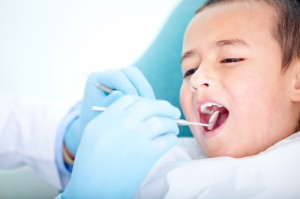 One of the things that parents wait in anticipation for is the appearance of their baby’s first tooth. This usually starts to pop up at 6 months, and the lower teeth are often the first to come in. By the time your child is around 3 years of age, all 20 baby teeth should be present.
One of the things that parents wait in anticipation for is the appearance of their baby’s first tooth. This usually starts to pop up at 6 months, and the lower teeth are often the first to come in. By the time your child is around 3 years of age, all 20 baby teeth should be present.
Your next concern would be when these temporary teeth will start falling out, and when their permanent set will start to grow. It has been said that baby teeth do not really have a set timeline for when they come loose, and when permanent teeth come in to take their place. This is generally true since some kids have been known to start losing their baby teeth as early as four years of age, and as late as 7 and 8. They will often have their full set of permanent teeth when they reach the age of 13.
No matter when your child starts to lose their primary teeth, you should be there to help them, should they need you to. More-often-than-not, your kids don’t really need that much help when it comes to these teeth falling out since these usually come loose on their own due to the pushing up of the permanent teeth. You might just need to keep an eye out that they do not end up swallowing their tooth accidentally should this fall out while they are eating, or when they are asleep.
When you find that one of their primary teeth is coming loose, you should not remove this by force. Do not try to do what people in the old days do (tie a tooth to a doorknob with a piece of string, and yank it loose) since this will just traumatize the kid if such an act brings the pain. All you need to do is to let the tooth naturally fall off. You can, however, let your child wiggle it every now and then to help it loosen a bit more, as long as it does not hurt your child.
There is nothing much to do when it comes to these teeth coming off, except probably when there is a stubborn tooth that just won’t fall off but is already loose. This kind of a situation warrants a visit to your dentist, since the delay in the falling off of such a tooth may result in the permanent one emerging from the side of the gums, giving your child a crooked smile. If you suspect that a tooth is not coming out as soon as it should, then you really take your child to the dentist.
When their permanent teeth start emerging, this is a good time to reinforce good dental habits. Remind your child that brushing their teeth regularly, and in the right manner, is important. Let them know that flossing is also needed in order to protect the gums, as well as the base of their new teeth. Make sure that you also take them to their dentist as soon as the new tooth comes out so that their dentist can take a look at it. Remember, these will be the teeth they will have for the rest of their life, and if you want them to have a full set for as long as it is possible, proper dental care and hygiene is needed.
- St. Lawrence Dentistry Looks Forward To St. Patrick’s Day! - March 12, 2025
- Understanding Dental X-Rays and Radiation: What You Should Know - January 13, 2025
- Happy New Year from St. Lawrence Dentistry! - December 30, 2024









